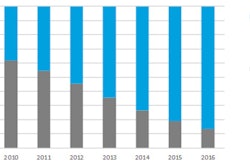GE Healthcare said pooled results from phase III brain autopsy and biopsy studies using its F-18 flutemetamol PET imaging agent demonstrated a strong concordance between the flutemetamol images and beta amyloid brain pathology associated with Alzheimer's disease.
In data presented at the 16th Congress of the European Federation of Neurological Societies (EFNS) in Stockholm, Sweden, four separate biopsy studies found that F-18 flutemetamol detected beta amyloid with a median sensitivity ranging from 75% to 100% and specificity ranging from 99% to 100%. A similar range was found for autopsied subjects, and visual image assessment also showed a high level of reader agreement, according to GE.
The clinical development program examined a total of 180 end-of-life subjects and 49 subjects with suspected normal pressure hydrocephalus (NPH) who underwent in vivo cortical biopsy. Of the 180 end-of-life subjects, 69 were followed to autopsy, GE said.
GE said the data will be used in support of an application for regulatory approval it intends to file in the U.S. and European Union later this year for F-18 flutemetamol.



















